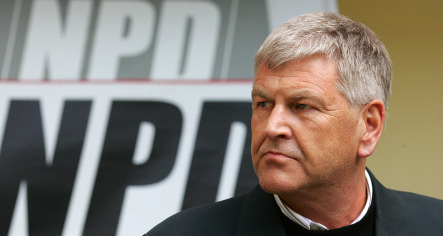And while many mainstream politicians would be happy to see the far-right extremist party collapse, others fear that should that happen, its followers could be swept up in a more effective pan-European movement.
“Of course it is a fight for survival if the Bundestag wants to cut us off completely from party financing.” NPD leader, Udo Voigt said during the party’s regional conference in Saxony at the weekend.
Der Spiegel reported that the party was close to bankruptcy after the Bundestag deferred payment of more than €300,000 from the statutory party financing budget because of irregularities in the party’s 2007 accounts. Fines of up to €1.9 million could even be imposed.
Voigt told Die Welt newspaper, “Financially the NPD is broke.”
He also admitted internal problems within the NPD, attacking two other high-profile members Holger Apfel and Udo Pastörs, while saying that his rival for the national leadership, Andreas Molau had joined the other neo-Nazi party in Germany, the DVU.
But German politicians who have tried and failed to ban the NPD as unconstitutional should not yet write off the forces of the far Right in the country.
Florian Hartleb, extremism researcher told Die Welt the party could split into two.
If the party was to be dismantled, he said, “The two wings would no longer have any party political cohesion. The so-called free forces, the Kameradschaften, the neo-Nazis, which Voigt bound to the NPD, would develop into a sub-cultural movement with no party political backing.”
The other wing of support, which occupies a political position between conservatism and far-Right extremism, could also be left looking for a political home.
Andreas Molau, who sees himself as the champion of this, less radical wing, told Die Welt he had not joined the DVU, but was seeking joint membership of it and the NDP, in order to conduct public relations work for the DVU.
“The NPD is at a crossroads”, he said.
He said he hoped his decision to move towards the DVU would attract what he called the ‘many politically capable forces’ in the NPD who he said had been turned off by the revisionism of party vice chairman Jürgen Rieger.
He even said he hoped to help create a modern nationalist party, which could combine the forces of DVU and NPD. “It could in the future be called ‘The Right’ or whatever,” he said.
But the impulse should be to merge forces and find new projects – much as The Left party had successfully done, he said.
European parties may well cooperate more closely, with Molau saying he was in contact with Spanish and French colleagues as well as the Freedom Party in Austria and the Belgian Flemish party.
On the June 23 the DVU will take part in the elections to the European Parliament, as agreed in the “German pact”, leaving the NPD to contest the national parliamentary elections.


 Please whitelist us to continue reading.
Please whitelist us to continue reading.